Stephen Roney's Blog, page 224
September 7, 2020
On Supposed Christian Privilege

Friend Xerxes has written a column, to my surprise, asking his readers to try to imagine what it must be like for Christians in India, where they are in trouble if they proselytize. Canadian Christians ought to recognize their privilege.
“In Canada, we treat Christianity as the norm,” he writes. “But what would it feel like if the Christian culture you take for granted turned you into a persecuted minority?”
I don’t really have to imagine. I have lived in Saudi Arabia and in China, both places where Christian proselytizing can land you in prison.
But I also never thought of Christianity as the norm in Canada. Secularism, not Christianity, is the norm.
Xerxes points out that four of our major holidays, Christmas, Easter, Hallowe’en, and Thanksgiving, have Christian roots. That is true, but they have been largely secularized: just a day off work, just gifts or candies for the kids. I think a good case can be made that the modern secular celebration of Christmas, or Hallowe’en, or Mardi Gras, is a subversion of the Christian meaning. Indeed, such arguments are often made.
Xerxes might have pointed out, but didn’t, that our grouping of days into weeks, and our weekend rest period, is also a Christian artifact; as is our counting of years from the birth of Christ. But how significant is that? Buddhist, Muslim, and Communist nations all also use this system now, without this expressing any deep Christian commitment. What once was Christian has been secularized.
A majority of Canadians are still nominally Christian, and, in a democracy, that makes active persecution less likely. Nevertheless, a recent report for the UK government concluded that Christians are the most persecuted religious group worldwide, accounting for 80% of all cases. With the level of persecution at an all-time high, and growing.
Severe and open persecution of Christians in the past broken out in majority Christian countries: in France during their revolution, in Spain during theirs, in Mexico during theirs. In the Soviet Union and throughout the Eastern Bloc for seventy years.
There is an automatic antagonism between the secular powers, who want to do as they will, and those meddlesome priests and preachers who insist on moral standards. It can reveal itself any moment the situation permits.
We seem to be heading into such a period now in Canada and the USA. People are trying to burn down churches, stab priests at the altar, show up at services with guns and intent to kill. The rioting in the streets is growing more clearly anti-Christian night by night. Last week, a statue of the Virgin Mary was beheaded at a church near me.
In recent years, declarations by the courts that there is an inalienable human right to abortion, and to homosexual sex, seem targeted against Christianity. Yes, targeted against Christianity, not in favour of those who want to get an abortion or to have gay sex. If that were the goal, it could be accomplished just as well with legislation. Making gay sex and abortion human rights instead renders traditional Christian teaching and practice illegal, and vulnerable to official persecution. Which has begun.
How can Xerxes’s perception be so different from my own? Because, I suspect, his “Christianity” is not Christian. In mainstream Protestantism, and too often among Catholics as well, what passes for Christianity is just the current social consensus, whatever it happens to be.
Christianity is essentially counter-cultural, from its inception. Jesus was executed as a criminal. It is not the easy or the obvious way: that way leads to destruction. To endorse instead the current social consensus, whatever it might be, is to endorse the anti-Christ.
'Od's Blog: Catholic comments on the passing parade.
Published on September 07, 2020 08:47
September 6, 2020
An Early and Tentative Endorsement
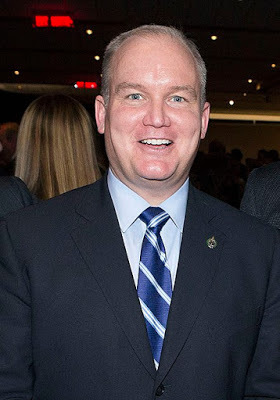
Rumour is that Justin Trudeau’s Liberals are planning a big spending Throne Speech when Parliament comes back from prorogation.
This makes sense. The BQ has said they will vote no confidence. The Conservatives can be expected to as a matter of course. Promising lots of new spending on some of the NDP’s priorities is the obvious way to make it hard for the socialist party to vote against them. The NDP are reputedly strapped for funds in any case, and probably would not want an election.
But there are also rumours that the Liberals actually want to go to the people. Promises of big spending can also be to get votes. If they aren’t voted out, they retain the right to call an election unilaterally—on the premise that such an ambitious new programme needs a mandate.
Why would they want an election now, in the midst of the WE scandal?
Perhaps because worse is to come, and they know it. Perhaps also because, as things stand, it looks as though the US will soon have a COVID vaccine, and the UK will soon have a vaccine, and China, and Russia, and Canada will not. I don’t know the details, but it looks to me as though the government was counting on a co-production with China, and China double-crossed them and is keeping it all for themselves. Now they’ve missed the boat on reserving other most promising vaccines, and there will be hell to pay.
If they can get in a quick election call by the end of September, they might make it to the ballot box before the debacle becomes obvious. Bad as their prospects might look now, they might soon look worse.
If all this is right, it seems urgent to back Erin O’Toole. Wexit and the PPC may have more attractive platforms for many, but the priority this time around may be to prevent the promised spending spree. And, indeed, prevent a spiral into open conflict like we are seeing in the US. It might be the moment for a moderate figure like O’Toole.
'Od's Blog: Catholic comments on the passing parade.
Published on September 06, 2020 06:06
September 5, 2020
The Proper Limits of Forgiveness
Jesus said to his disciples:
“If your brother sins against you,
go and tell him his fault between you and him alone.
If he listens to you, you have won over your brother.
If he does not listen,
take one or two others along with you,
so that ‘every fact may be established
on the testimony of two or three witnesses.’
If he refuses to listen to them, tell the church.
If he refuses to listen even to the church,
then treat him as you would a Gentile or a tax collector.
Amen, I say to you,
whatever you bind on earth shall be bound in heaven,
and whatever you loose on earth shall be loosed in heaven.
Again, amen, I say to you,
if two of you agree on earth
about anything for which they are to pray,
it shall be granted to them by my heavenly Father.
For where two or three are gathered together in my name,
there am I in the midst of them.”
(Matthew 18: 15- 20)
This passage puts the lie to the common false claim that Christianity calls for overlooking wrongs, turning the other cheek, forgiving without apology or admission of wrongdoing. Rather, it outlines the proper legal procedure. If the violator admits the wrong, apologizes, seeks to make amends, one is obliged to forgive, seventy times seven times. But if he persistently refuses to acknowledge the wrong, “treat him as you would a Gentile or a tax collector.” You shun him.
The words immediately following, moreover, look as though they are saying that heaven itself will exact revenge. His behavior (or our own behavior) in such a situation determines his eternal fate. “’Vengeance is mine,’ saith the Lord.” God will impose the punishment.
The passage makes a second vital point.
The final passage is often misquoted as “where two or more are gathered in my name.” And so is sometimes used to attack individualism in favour of the collective. This overlooks the fact that it sets an upper as well as a lower limit. This same number of witnesses, two or three, seems to be repeated throughout the larger passage; as though it is significant, and not to be glossed over. This is not about the collective, but about individual friendships.
Jesus, with thousands of disciples, chose only twelve apostles. And only the Twelve were invited to the first mass. He seems to have deliberately set an upper limit to the numbers of “the church” in this sense, the local congregation. Twelve is perhaps the rough upper limit at which each member of the group can have a real personal connection with each other member—it is a network of individual relationships, rather than a collective or corporation with a character of its own.
This of course implies that the current Catholic congregations are too large. In my experience, this is so. We need to break out into smaller prayer groups. This may be the key to the success of the Charismatic movement.
'Od's Blog: Catholic comments on the passing parade.
Published on September 05, 2020 07:33
September 4, 2020
Got to Get Us Back to the Garden...
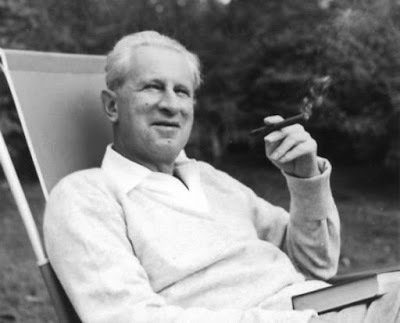 Marcuse
MarcuseWhat’s this madness we are now calling Critical Theory? I know something of it, since it attracted me too back in the 1970s. It is an attitude that has been with us throughout history, and no doubt before.
Terence Corcoran’s recent article in the National Post mentions Herbert Marcuse. He was indeed a major voice for the tendency then, as was Norman O. Brown, and Aldous Huxley.
Marcuse’s thinking was encapsulated by a graffito said to have appeared during the Paris Uprising in 1968. “Beware—even the ears have walls.”
Cool. Very Sixties. We were born to bliss; but had all been trapped by mind-forged manacles. “If the doors of perception were cleansed,” as William Blake had put it, “everything would appear to man as it is, Infinite. For man has closed himself up, till he sees all things thro' narrow chinks of his cavern.”
Aldous Huxley loved and used that quote, as he promoted the recreational use of LSD; it inspired the name of “The Doors.”
Norman O. Brown’s pitch was similar: we had somehow tricked ourselves into seeing only certain parts of our body as erogenous. We must recover the sexuality of it all, of all things, and live in a constant state of orgasm.
You can perhaps see the attraction. You can see how some people would get violent in the service of such a goal, and view anything that seemed to stand in the way of it as “fascism.”
What stands in the way of it, ultimately, is anything beyond the unknowing wonder of a newborn child. Civilization was a terrible blunder. Any assumptions about the nature of reality are oppressive. Thoughts of right and wrong, of morality, are only efforts to control. Logic itself is oppressive.
Hard to argue against that, because being illogical, nonsensical, or self-contradictory simply does not matter. In fact, the simple act of arguing against it is oppressive.
The image, in conventional terms, is of returning to the state of the Garden of Eden.
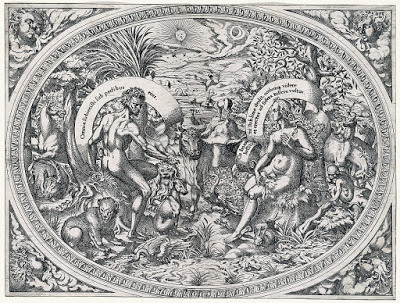
And the Judeo-Christian tradition has its response, for this is an eternal desire. The way back is barred; the goal, though it might seem infinitely desirable, is impossible. And it is impossible because of sin.
What sobered me up personally was the movie “A Man for All Seasons.” There is an exchange in it between St. Thomas More and the young hotblood, Will Roper:
Roper: So now you’d give the Devil benefit of law?
More: Yes. What would you do? Cut a great road through the law to get after the Devil?
Roper: I’d cut down every law in England to do that!
More: Oh? And, when the last law was down, and the Devil turned round on you – where would you hide, Roper, the laws all being flat? This country’s planted thick with laws from coast to coast – man’s laws, not God’s – and, if you cut them down – and you’re just the man to do it – d’you really think you could stand upright in the winds that would blow then? Yes, I’d give the Devil benefit of law, for my own safety’s sake.
We cannot go back, any more than we can crawl back into the womb. The only way is forward to something new, a city on a hill.
And trying to knock down all the fences is, consciously or not, doing the Devil’s work, and allowing him to range free.'Od's Blog: Catholic comments on the passing parade.
Published on September 04, 2020 08:51
September 3, 2020
Critical Theory
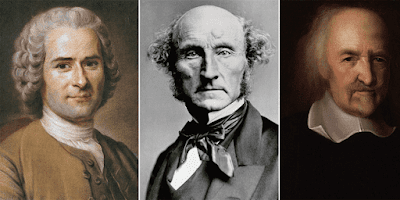 Rousseau, Mill, Hobbes
Rousseau, Mill, HobbesTerence Corcoran has written a piece on Critical Theory for the National Post.
I’m familiar enough with Critical Theory. Marcuse was a thing back in first year undergrad, and I watched it grow like fungus through grad school. I nearly smoked that mushroom myself. I’m currently working through it online with a doctoral student.
I say Corcoran doesn’t quite have a fix on it. He sees it as a rejection of the Enlightenment. That’s what Critical Theorists themselves say; but this is just the cover story.
Corcoran’s article illustrates “the Enlightenment” with pictures of Rousseau, Mill, and Hobbes. Rousseau believed civilization was on the whole a mistake; reason was a mistake. Mill was what we would today call a libertarian. Hobbes was a materialist who believed the only right the individual had against his government was to commit suicide.
Very different ideas. Some of which sound rather like Critical Theory. So what does it mean to “reject the Enlightenment,” or “reject Enlightenment ideals”?
The Enlightenment was not some unified movement, but just a time of questioning established ideas. All kinds of ideas emerged as a result. All of us have rejected some, and agree with some others.
Corcoran is right to see Marxism as a foundation of Critical Theory. But this explains nothing; it only raises questions. Marxism is not a virus: it cannot be caught by sitting in a class, it has to be chosen. Why does it command the schools, the universities, now the press and civil service, so many young minds, supposedly the best minds, and why is it still apparently growing?
Marxism ought to be thoroughly dead by now. All Marx’s predictions have turned out to be wrong. That was clear by 1917. Marxism should have been discredited again when Khrushchev publicly denounced Stalin. It should have been discredited when the Berlin Wall fell, and the Soviet bloc broke. Nazism has been utterly and forever discredited by the Holocaust: Marxism has produced larger holocausts, yet is not discredited?
It is also true, as Corcoran emphasizes, that Critical Theory condemns individualism, and promotes collectivism. Hence “race theory,” and the construction of an elaborate caste system under the term “intersectionality.” Hence too issues like cultural relativism and cultural appropriation.
But individualism is not a product of the Enlightenment. Individualism was always required by Christianity: the concept of free will requires it. The individual is the moral unit.
Merriam-Webster acknowledges this in defining the term. Individualism: “a doctrine that the interests of the individual are or ought to be ethically paramount.” “The conception that all values, rights, and duties originate in individuals.”
Individualism is not even a “western” thing. Buddhism and Taoism are radically individualistic. All true morality requires individualism. This is why the Devil is often understood as multiple: pandemonium; “My name is Legion.” The social power, in the New Testament, is in his control.
The devil led him up to a high place and showed him in an instant all the kingdoms of the world. And he said to him, ‘I will give you all their authority and splendor; it has been given to me, and I can give it to anyone I want to.’”This is the key that unlocks Critical Theory: it is all and simply a dodge to escape ethical demands.
Marxism is useful because it denies the existence of any objective morality. And it endorses sloth and envy. Freudianism, a second pillar of Critical Theory, is similarly useful because it denies the existence of objective morality, and endorses lust. Hence the emphasis on sex, LGBTQ and “gender” issues.
Put simply, “Critical Theory” is simply evil. It is the eternal temptation to behave badly.
It cannot end well.
'Od's Blog: Catholic comments on the passing parade.
Published on September 03, 2020 15:28
September 2, 2020
On Discrimination
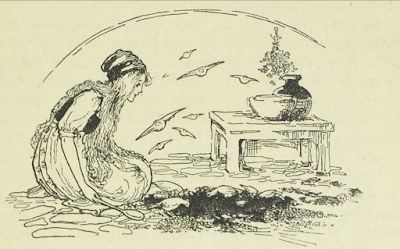 White doves help Cinderella discriminate among various grains and seeds.
White doves help Cinderella discriminate among various grains and seeds.A seemingly trivial example of our current moral confusion, or depravity: the ESL text I used this morning has a vocabulary exercise. One word tested is “discriminate,” and the possible answers are “a negative action” or “a positive action.” The student is expected to know or learn that discrimination is a negative action.
Discrimination is not an action, but never mind that.
First problem is avoiding the terms “good” and “bad” or “right” and “wrong.” The reference to morality is obscured. Instead, the author resorts to the pseudo-scientific terms “negative” and “positive.” We are not discussing mathematics or electricity. This seems calculated to confuse rather than clarify.
But, worse, it also gets the morality backwards. To discriminate is a good thing; yet the desired and expected answer is “negative.”
“Discriminate”; Merriam-Webster: “to mark or perceive the distinguishing or peculiar features of.” “To distinguish by discerning or exposing differences: to recognize or identify as separate and distinct.”
Thought itself is the process of discriminating one thing from another. Morality itself is a question of discriminating right from wrong. This is not just obscured, but perverted here.
This might be a lazy error; a question of confusing “discriminate” with “discriminating in employment on the basis of race or skin colour.” Never attribute to malice what is more easily explained by ordinary human incompetence. But this does look sinister. As though someone, either a constituency on earth or some Cartesian Evil Genius, or both, wants us to stop thinking in terms of right and wrong.
'Od's Blog: Catholic comments on the passing parade.
Published on September 02, 2020 05:29
September 1, 2020
Turning up the Gas
The term “gaslighting” has become popular; perhaps it has become overused. But if you want a clear, classic case of gaslighting, see Joe Biden’s recent belated condemnation of violence in the streets.
"The deadly violence we saw overnight in Portland is unacceptable. Shooting in the streets of a great American city is unacceptable. I condemn this violence unequivocally. I condemn violence of every kind by any one, whether on the left or the right."
"And I challenge Donald Trump to do the same."
Trump and the Republicans have been calling on Biden to condemn the violence for months. Trump has been offering federal assistance to stop it. Both Trump and Mike Pence called for it to end, and for Biden to condemn it, in speeches at the just-concluded Republican convention. And he has been silent. Kamala Harris, and members of his campaign staff, have been publicly encouraging continuing “demonstrations,” and covering bail for those arrested.
Up is down, right is wrong, lies are truth, and truth is lies.
Biden is a classic narcissist. A narcissist will gaslight automatically, robotically, and will accuse the victim or accuser of whatever they have been doing.
You see it now on the left consistently. There is no good faith there.
But “narcissist” is just modern psychological terminology for what would classically be called a “vicious” person—that is, a person who has developed a vice. It helps clarity if that is understood; not to uses the proper term is doing the Devil’s will. The Devil needs misdirection.
One vice leads to another, so “vicious” tends to develop its more common meaning. For the left as a whole, the original sin, I maintain, is lust, and abortion. But that has led as well to envy, and so to embracing Marxist dogmas; to deceit, wrath, and the rest, to varying degrees.
But even well-meaning, glad-handing old “Uncle Joe”? Everybody likes Uncle Joe, and everybody claims he is a nice guy in private. His apparent harmlessness may be the primary reason he suddenly became the Democratic nominee.
But he was never harmless. Everyone who knew him thought the same of John Wayne Gacy. The Devil is a gentleman. He is not so stupid as to appear as some ravening monster.
Being liked by all is not a good character reference. It only suggests cunning, and lack of principle. A truly good man will be fiercely disliked by many.
'Od's Blog: Catholic comments on the passing parade.
Published on September 01, 2020 08:06
August 30, 2020
Our Lady of Lebanon Beheaded
I know this church.'Od's Blog: Catholic comments on the passing parade.
Published on August 30, 2020 19:05
Macdonald Down

Yesterday a mob pulled down the statue of Sir John A. Macdonald in Montreal.
I am pleased to see that most online reactions condemn this. We are perhaps not fully mad yet. Premier Legault immediately said the statue must go back up. Jason Kenney said if Montreal does not want it, Edmonton does, for the provincial legislature. Erin O’Toole showed his bona fides by condemning it, praising Macdonald, and saying politicians need some spine.
Someone, however, posted a link to this justification for the action. It is interesting to see how mad at least some Canadians have become.
Let’s look at some of the points:
“The myth of Macdonald as the pillar of Canadian nationhood and a paragon of integrity seems rock-solid.”
It has never been common to see Macdonald as a paragon of integrity. More common are tales of his drinking, and of his wheeling and dealing.
Nevertheless, his accomplishment of uniting Canada, extending it across half a continent, from sea to sea to sea, then binding it with a railroad over muskeg and mountains, is worthy of commemoration. To topple Macdonald’s statue is an attack by proxy on the very idea of Canada itself.
“The Empire’s vast colonial projects were aimed at assimilating subject Indigenous populations (generally non-white) and, of course, exploiting their natural resources. This was argued to be something beneficial to the ‘civilizing’ of such ‘inferior’ peoples; in short, the racist notion of the ‘White Man’s Burden.’
This institutionalized racism underlay the all-White immigration policy of South Africa, Canada, Australia and New Zealand which spanned the last six or seven decades of the nineteenth century extending well into the twentieth century.”
The author contradicts himself. If the British Empire was about assimilating indigenous populations, how is this accomplished by an all-white immigration policy?
In fact, the British Empire was strikingly disinclined to assimilate indigenous populations. Compare India to Goa, Macao to Hong Kong, the US to Mexico. Other nations assimilated. The British simply ruled. Assimilating the small indigenous population of Canada could only have been a minor consideration in any case. Most federal policies seemed to prevent such assimilation: hiving them off on reserves. Of course, “exploiting” Canada’s natural resources, or those of other parts of the British Empire, was part of the plan: people are inclined to make a living. Refuse to exploit your natural resources, and you will probably freeze to death before you die of thirst.
European empires generally were intended to civilize the people subjugated—in other words, to improve their lives, by introducing the benefits of European technology. This does not look venal, and it does not obviously look misguided. At least, a contrary case must be made. Would the Canadian Indians be better off without wheels, or houses, or electricity?
Canada did not have an “all-white immigration policy” during the last six or seven decades of the nineteenth century. Canada actually had an open door policy until 1885. In that year, restrictions were placed on Chinese immigration. The 1910 Immigration Act later allowed the government to restrict immigration of groups that might find the climate unsuitable. In terms of racial discrimination in immigration, that’s about it.
The climate concern may look racist to us today, but it does have a scientific basis. We are genetically adapted to our environment. People coming from generations living in tropical countries face some health issues in Canada. The recent COVID crisis revealed one: blacks and Hispanics are far more likely to die from it in the US, because with their darker skin they are almost always deficient in vitamin D. And, as I can personally vouch, and as the Brits all used to know well in the days of Empire, pale-skinned Europeans face health issues in the tropics. This may seem relatively trivial now, but people were more sensitive to this when medical science was not so advanced.
As to the restrictions on Chinese immigration, this was at the insistence of B.C. workers and trade unions, who felt they could not compete with them as cheap labour. Perhaps ungenerous, perhaps not, when you are poor and barely getting by; but not racist.
“Although the subject of limiting Chinese immigration to Canada has been covered, few Canadians know of the $500 ‘Head-Tax’ levied on would-be Chinese immigrants via the Chinese Immigration Act of 1885.”
The head tax imposed in 1885 was $50. It was raised to $500 some years later.
“Macdonald had made it clear that Chinese immigration was necessary for the building of the national railway. However, he considered the Chinese a ‘foreign race’ that ‘could not be expected to assimilate with our Aryan population.’
Hitler, no less an admirer of Aryan purity than Macdonald, would make a similar statement regarding Jews some four decades later.”
Macdonald used the term Aryan. Hitler used the term Aryan. Therefore, Macdonald was a Nazi.
When Macdonald used it, “Aryan” was a neutral scientific term. It is still used in linguistics.
Macdonald was being sensible; Chinese culture is different from European culture. Chinese do not assimilate well abroad. They tend to form “Chinatowns” and keep to themselves for generations.
“In 1923, Canada put in place laws meant to limit immigration from eastern Europe.”
The only immigration legislation passed in 1923 was a new Chinese Immigration Act. Canada was actively promoting immigration to the Prairies from Eastern Europe at this time.
Although there were no restrictions on others, Canadian governments always actively promoted immigration from the United Kingdom. This stands to reason: just as current Canadian governments tend to be more concerned with the welfare of Canadians than of foreigners. Canada was part of the British Empire.
“The flagship of Canadian institutionalized racism was, and remains, The Indian Act (1876) adopted in 1876 and amended several times since.”
Agreed. But the Canadian government is not responsible. The essential features of the Act were forced on Canada by the requirements of the Indian Treaties. Canada tried to abolish the Act in 1969. Our treaty partners, the Indian bands, refused. It is at their insistence that it has remains in force.
“Canada was built on the dispossession and ethnic cleansing of Indigenous populations.”
If ethnic cleansing was intended, it was a historic failure. There are far more treaty Indians in Canada today than at Confederation, and they are among the fastest-growing segments of the population.
Nor have they been dispossessed. Eighty-nine percent of Canada is still Crown land, and, by treaty, the aboriginal people still have a right to hunt and scavenge there at will. Should any really want to, they could continue their life just as it was before the first Europeans arrived. The rest of Canadian lands, they have usually ceded for an agreed compensation. Ceded, in effect, to themselves, as Canadian citizens.
“Macdonald started Residential Schools, the odious and dehumanizing institution to which Indigenous children, torn away from their families, were sent to be assimilated and brutalized, to be ‘civilized’ in the White European way.”
The residential schools were demanded by the Indians by treaty, not the federal government. The federal government would no doubt have preferred to spend less money by sending Indians to the regular schools, or by simply leaving them to their families to educate. Moreover, if the intent were to turn Indians into “civilized Europeans,” the way to do this would again have been to send them to the regular schools, to learn the same things European children learned, along with them. The residential schools, misguided as they might have been, were an expensive way to preserve a distinct Indian culture.
“In 1873, Macdonald created the North West Mounted Police, today the RCMP, whose mission was to harass and control Indigenous peoples in the Prairies.”
The impetus behind the founding of the NWMP was the Cypress Hills massacre of 1873, in which twenty Assiniboine Indians were murdered by American traders and bison hunters. In other words, the primary mission of the NWMP, certainly in the popular mind, was to protect Indians. Secondarily, it was to establish Canadian sovereignty and forestall American incursion.
“Macdonald subsequently undertook a policy of starving the Métis and First Nations out of the Prairies. This was done to build a railway through their dispossessed lands – by killing off their principal source of food, the bison, much as the Americans were doing in the United States to Indigenous peoples there.”
Even if Macdonald had wanted to kill off the bison, he did not have anything like the manpower on the Prairies to do so. There are claims that some American authorities had this idea, but if so, they too probably could not have done so. And Macdonald had no control over them. The buffalo were depleted by overhunting—and probably overhunting primarily by the Indians, now that they had rifles and horses.
“In 1882, Macdonald confirmed his policy of genocide against Indigenous peoples by way of starvation in Canada’s House of Commons:
‘I have reason to believe that the agents as a whole … are doing all they can, by refusing food until the Indians are on the verge of starvation, to reduce the expense.’
David Mills, a Liberal MP, followed Macdonald’s ode to genocide with the complaint that they were not being starved enough:
‘No doubt the Indians will bear a great degree of starvation before they will work, and so long as they are certain the Government will come to their aid they will not do much for themselves.’”
The quotes disprove what they claim to prove. Macdonald, despite political pressures, would not let the Indians starve.
Some context is in order. In the latter half of the 19th century, the Indians of the Northwest faced general starvation. This was not primarily due to the decline of the buffalo, either. It was because of the decline of the beaver. The Indians had been making a good living by selling pelts to the Hudson’s Bay and Northwest Companies. Through over-exploitation, the beaver population had gone into severe decline—a process seen in eastern Canada centuries earlier. Having lost the greater part of their livelihood, the Indians might have gone back to hunting and scavenging; but that way of life always involved periodic mass starvation.
Accordingly, the government plan was to settle them on reserves with basic agricultural supplies, and show them how to farm. This may or may not have been done inefficiently and with supplies gone missing—this was government, and in a remote area.
The Indians, on the other hand, had the idea that, with transfer of sovereignty in the treaties to their “Great Mother,” the government had taken responsibility for their welfare as if a parent. This came up often at the treaty negotiations: “if there is famine, will the government feed us?” Although they took care not to put anything in the treaties, the federal negotiators, tended to reply that, if there was a general famine, the government would of course do what it could. They could not let the Indians starve.
So, many Indians calculated that they did not need to farm or otherwise work any longer.
In a time when there was no sort of welfare for the general population, the resultant need to support the Indians, while their neighbours needed to farm their land, did not sit well with government or public.
This Indian assumption more or less prevails into the present. The Indians have been trapped in poverty by it ever since.
“Riel was demonized by the English-Canadian press while Macdonald was credited with being a saviour of the nation.”
This, by careful omission, is the opposite of the truth. Riel was lionized by the French-Canadian press. While there was a strong lobby against him personally in English Canada, the Metis uprising was also widely romanticized, as it still is today. It became the subject of popular novels, in which the heroes were always Metis. Macdonald lost a great deal of popularity by allowing the hanging of Riel. Some say his Conservative Party has never recovered.
“In 1885, concerning the execution of Louis Riel for treason, Macdonald states, confirming his contempt for the Métis and French Quebec: ‘He shall die though every dog in Quebec bark in his favour.’ Macdonald’s reference to ‘dogs in Quebec’ did not have anything to do with our four-footed canine friends. The racism is explicit.”
This reveals how popular Riel was in Quebec. If there was any racism in Macdonald’s famous comment, it was only implicit. Quebecois are not dogs—the present author shockingly asserts that they literally are. They are also not of a different race than Macdonald.
The obvious interpretation of the word “dog” is that the word “dog” means “dog.” Any other interpretation is on this author, not Macdonald.
“Again, in 1885 … Macdonald hanged eight Cree warriors who had dared to resist the destruction of their way of life”
The eight were hanged for murder, explicitly unconnected to any military objective. Even if their rebellion was not treasonous, they were war criminals.
“In 1885 Macdonald also passed The Electoral Franchise Act which limited the rights of Blacks, First Nations and other visible minorities to vote.”
Macdonald proposed in 1885 to extend the vote to both treaty Indians and unmarried women. He was, sadly, too far ahead of his time, and parliament refused this. However, the act they passed still had no restrictions on voting by blacks. It did not introduce any new restrictions on the franchise.
Why would someone write such a series of falsehoods? I do not think incompetence is sufficient to explain it. Rather, this is the fruit of postmodernism. Truth has no value: one simply constructs the “narrative” one prefers.
And any great man is vulnerable to the envy of others.
'Od's Blog: Catholic comments on the passing parade.
Published on August 30, 2020 14:21
A Leftist Reviews the Two Conventions

My leftist buddy Xerxes has reviewed the two American conventions, and declared the Democrats the winners based on having the right rhetoric. They, after all, kept using the keywords “respect, dignity, compassion… equality and justice.”
This reinforces the general impression that leftist politics is fundamentally dishonest: all it cares about is the right rhetoric. Say you are for respect, and you can treat anyone you want disrespectfully, call them deplorable, call them racist, call them fascist; say you are for choice, and you can limit everyone’s choices everywhere; say you are compassionate, and you can kill babies; say you are anti-fascist, and you can be fascist; say you are for peace, and you can start wars, or smash and burn in the streets.
In short, current leftist politics is a con job.
While all politicians play with the truth, Republicans seem to resist such verbal tricks. When George W. Bush peddled the slogan “compassionate conservatism,” he got blowback from his party. One chooses one’s policy because one believes it is compassionate. That should go without saying. Anything more is deceit.
So too, obviously, with phrases like “I give you my word.” Xerxes is impressed that Biden is ready to give his word. If this does not go without saying, he is not an honest man. To be fair, Trump often uses a similar verbal trick, “Frankly…” As a good general rule, whenever anyone starts a sentence with either of these terms, you can assume they are lying, and accustomed to lying.
Of the Republican clambake, Xerxes writes:
“Everyone touted ‘law and order’ -- even as a law-and-order representative shot a black man in the back, seven times.”
This is a good example of a rhetorical trick. Or several. A non sequitur, and then a cherry-picking of details. The man was “shot in the back seven times,” true, but while resisting arrest, at the scene of the crime, struggling with police, carrying a knife that he refused to drop when repeatedly ordered to do so, and lunging into his car as if to grab something. He had already been tasered twice, without apparent effect. There is also the completely unsubstantiated implication here that he was shot because he was black. Otherwise why mention it?
In any case, our civic duty is to await a formal investigation before drawing any conclusions on the incident. Anything else is, literally, prejudice. Our shared rights and our community life depend on this; due process is of the essence of liberal democracy. Lynch mobs are not a moral option.
Xerxes writes, dismissively,
“Republicans see America as being under attack. By socialism. By vandals and looters. By pro-abortion lobbies. By mail-ballot fraud.
‘Don’t let them steal this election from you,’ Trump warned.
And, of course, under attack by fake or false news on the mass media.”
All this is true. Since Republicans believe it, and they account for fifty percent or so of the US population, it seems to me the perception needs to be addressed. What is the counter-argument? To simply assume no obligation to disprove the statement seems like profound arrogance. “Of course we’re here to take your guns.”
Rather than disagree with the Republican claim, Xerxes accuses Trump of lying in general, citing a Washington Post tally of “disprovable assumptions.” He ignores the obvious possibility that the Washington Post might be lying—other than from prejudice, why implicitly trust one witness, and not the other? One needs further evidence.
All politicians lie. Surely no adult can think otherwise. The obvious lie is that this is somehow peculiar to Trump. Trump actually stands out from that crowd for his relative truthfulness; perhaps because he is not a career politician. He has made a genuine effort, for example, to keep campaign promises; and a foundation of his appeal to his supporters all along is that he is inclined to say just what he thinks. The things the left exaggerates into “lies” are generally only exaggerations, matters of showmanship or salesmanship with no intent to deceive or likelihood of deceiving.
Xerxes cites as particularly impressive Biden’s promise to “listen to the science.” As if this distinguishes him from Trump, or any other politician. Science is our modern religion. Saying science is on your side is like saying God is on your side in older times. Everyone will do so as a matter of course, unless they’re honest. The claim is meaningless on several levels: first, because “science” actually asserts nothing; second, because anyone can claim anything to be “scientific”—Freud, Marx, Lysenko, or L. Ron Hubbard; third, because this is an appeal to authority, at best weak evidence, often an outright fallacy; and fourth, because any claim of “scientific consensus” is the ad populum fallacy. Scientists disagree.
That said, the Democrats and Biden clearly do not respect scientific consensus when it does not suit their agenda. They do not accept that a human embryo is both alive and human; they do not accept that there are biological differences, even at the cellular level, between men and women. They believe it is vital to wear masks and keep social distance at any Republican meeting, but not if you are demonstrating against the police.
Xerxes goes on, more absurdly, to claim Trump is against science, as if anyone is in modern times. Scientists are “Exactly the people Trump doesn’t listen to. Especially if they disagree with him on injecting oneself with household bleach or taking medications that delay COVID-19 recovery.”
Here are a couple of good examples of outright political lies. Not original to Xerxes; he is probably just another victim. Trump has never advised anyone to inject themselves with household bleach. Trump has never advised anyone to take a medication that delays COVID recovery.
I presume Xerxes means here his reference to using UV light as an internal disinfectant, something currently being studied by scientists. And to hydroxychloroquine, which, according to the most recent study, the largest yet, even when used alone reduces COVID-19 mortality by over 33 percent.
The definitive study on hydroxychloroquine, it is true, has for some reason not yet been done. Until it is, it is certainly at a minimum premature to say it delays COVID-19 recovery. That amounts to a falsehood.
Xerxes is impressed, as others have been, but Biden’s acceptance speech:
“Joe Biden’s acceptance speech at the end of the Democratic convention proved he could put together a series of sentences with a coherent message. Donald Trump’s two acceptance speeches, on the first day of the Republican convention and the last evening, proved that he couldn’t.”
Again, this seems an example of the left seeing only appearances, and not caring for substance. All that either speech demonstrated for certain was that the candidates are both capable of reading from a teleprompter. The rest may very well be up to the speechwriter.
Yet Trump is here again an exception. Unlike almost all other modern politicians, Trump is actually inclined to speak, at his rallies, if not here, extemporaneously, and at length. This proves him considerably more verbally adept than any other active politician you could name, let alone Joe Biden. His extemporaneous speeches turn out to be extremely funny; which is why people come out to hear them in such numbers. He is, in fact, a talented stand-up improvisational speaker, with an utterly distinctive style. His phrasing is well-crafted to be memorable and quotable: “fake news”—like everyone else, Xerxes picked up that one himself. “Crooked Hillary.” “Little Marco.” “Low-energy Jeb.” “Little rocket man.” “Make America Great Again.” These have been devastatingly effective.
Xerxes especially liked Biden’s closing: “love is more powerful than hate, hope is more powerful than fear, and light is more powerful than dark.”
He might have noticed, but didn’t, that Biden or his speechwriter cribbed it from Jack Layton.
Not the first time Biden has been caught plagiarizing.
'Od's Blog: Catholic comments on the passing parade.
Published on August 30, 2020 07:39



